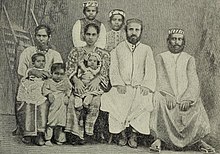This article needs additional citations for verification. (February 2023) |
יְהוּדֵֽי־קוֹצִֽ׳ין കൊച്ചിയിലെ ജൂതന്മാർ | |
|---|---|
 A Malabar Jewish family (1900) | |
| Regions with significant populations | |
| 7,000–8,000 (estimated)[1] | |
| 15[2] | |
| Languages | |
| Hebrew, Judeo-Malayalam | |
| Religion | |
| Judaism | |
| Related ethnic groups | |
| Paradesi Jews, Knanaya, Sephardic Jews, Bene Israel, Baghdadi Jews, Mizrahi Jews, Saint Thomas Christians, Dravidian people | |
| Part of a series on |
| Jews and Judaism |
|---|
Cochin Jews (also known as Malabar Jews or Kochinim from Hebrew: יְהוּדֵֽי־קוֹצִֽ׳ין, romanized: Yehudey Kochin) are the oldest group of Jews in India, with roots that are claimed to date back to the time of King Solomon.[3][4] The Cochin Jews settled in the Kingdom of Cochin in South India,[5] now part of the present-day state of Kerala.[6][7] As early as the 12th century, mention is made of the Jews in southern India by Benjamin of Tudela.
Following their expulsion from Iberia in 1492 by the Alhambra Decree, a few families of Sephardi Jews eventually made their way to Cochin in the 16th century. They became known as Paradesi Jews (or Foreign Jews). The European Jews maintained some trade connections to Europe, and their language skills were useful. Although the Sephardim spoke Ladino (Spanish or Judeo-Spanish), in India they learned Judeo-Malayalam from the Malabar Jews.[8] The two communities retained their ethnic and cultural distinctions.[9] In the late 19th century, a few Arabic-speaking Jews, known as Baghdadis, also immigrated to southern India from the Near East.[10]
After India gained its independence in 1947 and Israel was established as a nation, most of the Cochin Jews made Aliyah and emigrated from Kerala to Israel in the mid-1950s. In contrast, most of the Paradesi Jews (Sephardi in origin) preferred to migrate to Australia and other Commonwealth countries, similar to the choices made by Anglo-Indians.[11]
Most of their synagogues still exist in Kerala, with a few being sold or adapted for other uses. Among the 8 synagogues that survived till the mid-20th century, only the Paradesi synagogue still has a regular congregation. Today it also attracts tourists as a historic site. The Kadavumbhagam Ernakulam Synagogue was restored in 2018, it houses a sefer torah with occasional services, managed by one of few remaining Cochin Jews of the ancient Malabar Jewish tradition. A few synagogues are in ruins and one was even demolished and a two-storeyed house was built in its place. The synagogue at Chendamangalam (Chennamangalam) was reconstructed in 2006 as Kerala Jews Life Style Museum.[12] The synagogue at Paravur (Parur) has been reconstructed as Kerala Jews History Museum.[13][14]
- ^ "Jews from Cochin Bring Their Unique Indian Cuisine to Israeli Diners", Tablet Magazine, by Dana Kessler, 23 October 2013
- ^ "Ancient Indian Jewish community holds on to customs despite shrinking numbers". 13 September 2022.
- ^ The Jews of India: A Story of Three Communities by Orpa Slapak. The Israel Museum, Jerusalem. 2003. p. 27. ISBN 965-278-179-7.
- ^ Weil, Shalva. "Jews in India." in M. Avrum Erlich (ed.) Encyclopaedia of the Jewish Diaspora, Santa Barbara, USA: ABC CLIO. 2008, 3: 1204-1212.
- ^ Weil, Shalva. India's Jewish Heritage: Ritual, Art, and Life-Cycle, Mumbai: Marg Publications, 2009. [first published in 2002; 3rd edn] Katz 2000; Koder 1973; Menachery 1998
- ^ Weil, Shalva. "Cochin Jews", in Carol R. Ember, Melvin Ember and Ian Skoggard (eds) Encyclopedia of World Cultures Supplement, New York: Macmillan Reference USA, 2002. pp. 78-80.
- ^ Weil, Shalva. "Cochin Jews" in Judith Baskin (ed.) Cambridge Dictionary of Judaism and Jewish Culture, New York: Cambridge University Press, 2011. pp. 107.
- ^ Katz 2000; Koder 1973; Thomas Puthiakunnel 1973.
- ^ Weil, Shalva. "The Place of Alwaye in Modern Cochin Jewish History", Journal of Modern Jewish Studies, 2010. 8(3): 319-335.
- ^ Weil, S. 2019 (ed.) The Baghdadi Jews in India: Maintaining Communities, Negotiating Identities and Creating Super-Diversity, London and New York: Routledge.
- ^ Weil, Shalva. From Cochin to Israel, Jerusalem: Kumu Berina, 1984. (Hebrew)
- ^ Weil, Shalva (with Jay Waronker and Marian Sofaer) The Chennamangalam Synagogue: Jewish Community in a Village in Kerala. Kerala: Chennamangalam Synagogue, 2006.
- ^ "The Synagogues of Kerala, India: Architectural and Cultural Heritage." Cochinsyn.com, Friends of Kerala Synagogues, 2011.M
- ^ Weil, Shalva. "In an Ancient Land: Trade and synagogues in south India", Asian Jewish Life. 2011. [1]